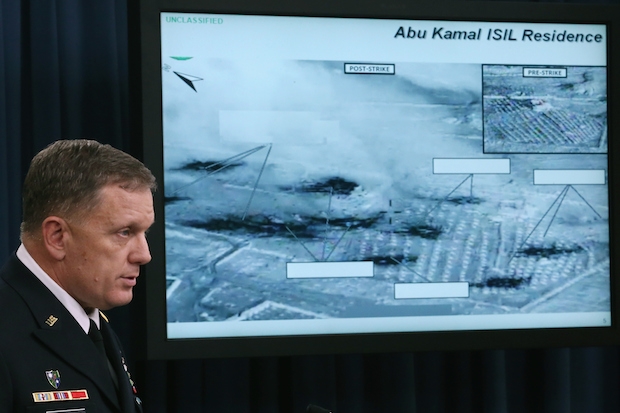So we’re back to bombing Iraq again, by the looks of things, for the third successive decade – this time to destroy the Islamic State, or Isis or whatever they’re called.
David Cameron, asked by an MP whether Isis was a ‘threat to the British people’, answered ‘yes’ and said: ‘This is about psychopathic terrorists who are trying to kill us. Like it or not they have already declared war on us. There isn’t a walk-on-by option.’
But has Isis declared war on us, and is it actually a threat to us, and if so why? Isis certainly poses a grave threat to its neighbours, and as with all militant Islamic groups its biggest victims are Muslims. But otherwise the group should not be a threat to Britain, a country with nuclear weapons.
Isis is a danger to Britain for one reason only, a reason that is blindingly obvious yet is never made on radio or television, or as far as I know in the comment pages of any newspaper. Britain now has a large Islamic population, pushing on 5 per cent of the total, and that is expected to increase to 10 per cent within a generation.
At this point in the article one is expected to add some caveat about most Muslims rejecting Islamism, which they obviously do, but you need only a very small number of people to bring about substantial security risks; estimates of public opinion in the past have put sympathy for al-Qa’eda-like groups at between 6 and 13 per cent of the British Muslim population, which is not insubstantial. Isis’s British contingent, somewhere between 400 and 500-strong, could cause chaos if allowed to return to Britain.
This isn’t a problem that will go away. Yesterday a report suggested that second- and third-generation British Muslims are more likely to be radicalised than their parents, diversity and multiculturalism being more of an alienating experience for the western-raised children than the immigrant parents. After all, radical Islamism is a product of modernity, including the mutually alienating process of mass immigration.
We often ask ourselves why so many jihadists come from Britain, but nobody asks if this might have something to do with the fact that Britain has embraced the ideology of multiculturalism more aggressively than in other countries.
Multiculturalism is an imperial idea, replacing the democratic ideal with the Ottoman millet system. It empowers central authorities who represent not just ‘the people’ but ‘the peoples’ — great for the people in charge, perhaps, but one of the downsides is that faraway conflicts that once would have posed us no threat become our problem, too.
Not that I’m against bombing Isis, if that’s what it takes, and as for the moderate, secularising forces in the Middle East, Muslim and non-Muslim, we should wish them all the luck in the world. But we ought to be honest about the reason we are involved.







Comments